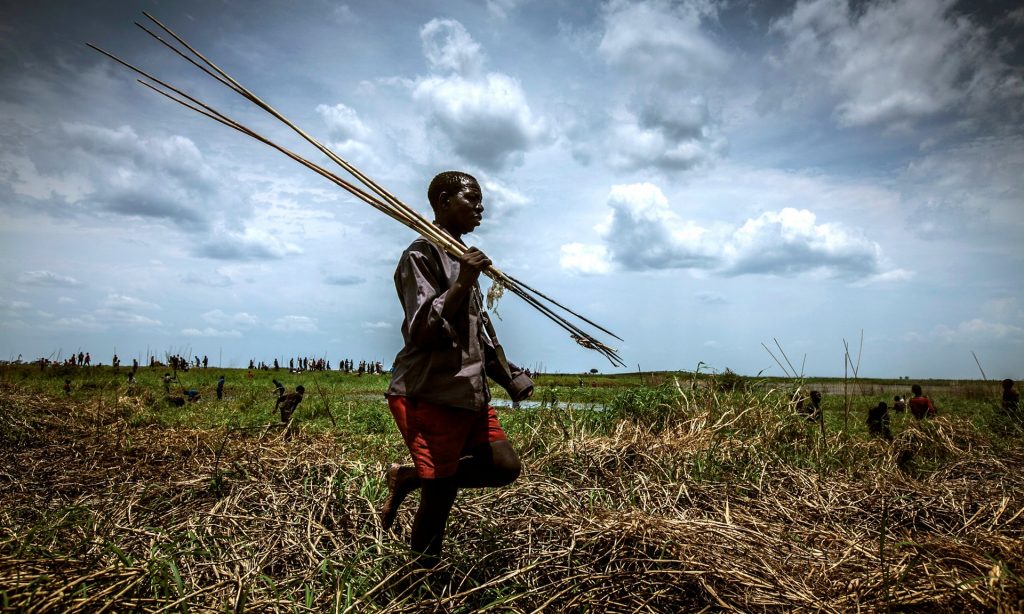
Photograph: Felix Clay/Duckrabbit/World Fish
When I first saw Louise Linton’s story on The Telegraph’s website about how her dream gap year in Zambia had turned into a nightmare I couldn’t believe what I was reading. She’d described 12-inch spiders, rebels taking over the country and the war in the Congo being between the Hutu and Tutsi people. At first some people thought it was satire (this isn’t a Zambia any of us recognise), but then I found out it was actually far worse – an excerpt to promote the actress’ new memoir.
There are enough untrue, harmful stereotypes out there about Africa without her latest contribution, and I’m fed up of seeing Zambia and other African countries misrepresented in the press. Apparently, a lot of other Zambians agree with me. On Monday, I started the hashtag #LintonLies and it’s now trending across Zambian Twitter.
Now, as a child of the continent, I do understand that many people have not visited Africa, and so what remains is the impression of a war-torn dark continent infested with HIV and Malaria. While HIV rates in Africa remain high, and there is political unrest in some regions, it is not applicable everywhere.
What is wrong with this memoir by Louise Linton? So many things. I will elaborate a few examples…
Firstly, while Zambia is close to countries that have faced civil conflict such as Angola and Congo, I can’t think of one instance of Congolese rebels crossing over into the country’s borders to commit violent attacks (although some came as refugees). In fact, Zambia remains one of the top 10 most peaceful countries in Africa and played an important role in offering secure refuge for those who fled the conflict in the above mentioned countries. So I am confused as to which place in Zambia Linton is recalling when she described having to hide to avoid rebel shooting.
Second, she writes that the war in the Democratic Republic of the Congo was caused by the Hutu-Tutsi conflict. Wrong. The Hutu-Tutsi conflict happened in Rwanda – an entirely different country, and while the conflict over there did impact the DRC in many ways, it was not the primary cause of a serious struggle that has claimed the lives and homes of hundreds of thousands over the years. The DRC has had a long history of conflict stemming from a painful independence process, to power struggles, to conflicts over resources.
Thirdly, Linton references a little HIV-positive girl in the northern province called Zimba. This character is the only positive thing she highlights in her piece. However, it does not quite add up either. She mentions that the girl is from the Bemba community, but where Linton slips up is the name. Zimba, as any Zambian knows, is an eastern name. It is almost exclusive to the eastern province, and some parts of Malawi. But the Bemba tribe live in the north. It would be like finding a white, French person being called Xin Li in the 19th century – it just doesn’t happen. Zambians, especially rural Zambians, take pride in the tradition of naming and so it is not possible that a little girl would be given a name from another tribe. My deduction is that this character was made up or at least exaggerated for her memoir’s heartwarming factor. It’s sad she didn’t get her facts right, but Africa is just Africa … we’re all the same, right?
Lastly, Linton mentions a monsoon and 12-inch spiders. Zambia does not have a monsoon season. We have a rainy season but it’s really not that bad. The spider part just made me laugh out loud. Ms Linton, I believe you were talking about the Heteropoda Maxima, the world’s largest spider. However, those are native to Laos and have never been documented in Africa, much less Zambia.
As a Zambian, the whole article just made me cringe. But on a more serious level, it also made me wonder just how many other countries around the world people like her have falsely documented and gained credit for? The book is selling for around £8 and it seems no one stopped to check her facts during the publication process. As a writer, I am sorry to say that is a low point for literature and the industry.
Linton has apologised for causing offence, telling Buzzfeed: “I am genuinely dismayed and very sorry to see that I have offended people as this was the very opposite of my intent. I wrote this book with the hope of conveying my deep humility, respect and appreciation for the people of Zambia and my sincere hope of making a positive impact there as an 18-year-old volunteer in 1999.”
This doesn’t change the fact that a news organisation still chose to publish an extract of her memoir without fact checking it first. I am disappointed that the Telegraph labelled the excerpt – so full of holes – as a true story. I advise anyone who was planning to buy the book In Congo’s Shadow not to, because it doesn’t not give an accurate picture of Zambia. My advice is if you want to know about Africa, Asia or any other place you may be interested in but is not well-documented, visit it yourself to find out the truth.
A version of this article was previously published on Eyewoke.

